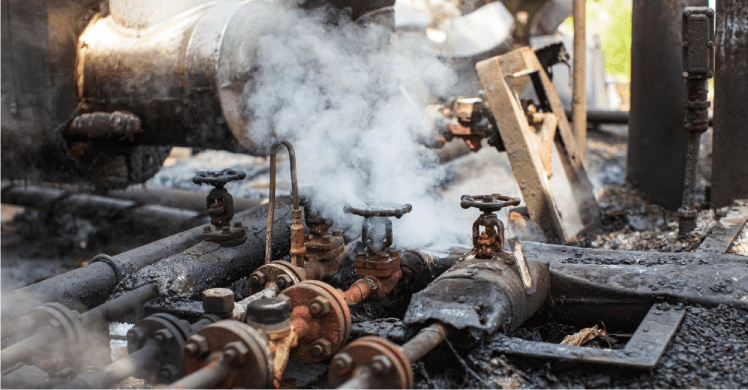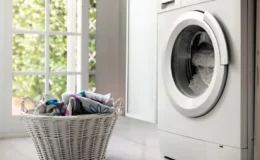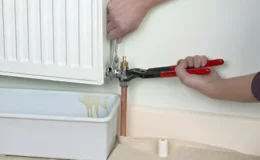🕑 4 minutes read

Millions of homes in the UK depend on natural gas as their primary energy source, which is a convenient energy source to heat the home, cook, dry clothes, and heat water. Although it is a convenient and safe energy source, a gas leak can pose a huge safety risk to families and homes.
A guide to gas Leaks:
It could be a loose connection, an aged pipe, a cracked connection, a faculty meter etc.
Old gas lines that are exposed start to corrode and are more prone to cause a gas leak. Minor hairline fractures eventually appear in the pipe's exterior, possibly due to the gradual erosion of the material.
Identifying a gas leak at home?
Gas leaks can be potentially dangerous to health and property. Knowing what to do in the event of a gas leak is critical. If you detect any of the following, then immediately call Cadent on 0800 111 999.
Natural gas has a pungent smell like rotten eggs.
Natural gas is colourless and odourless when it is in its pure form. Gas companies add substances known as odorants to natural gas to produce an odour comparable to sulphur or rotting eggs, making gas leaks easier to detect. The more areas you can smell gas, the stronger the odour suggests the leak could be serious. Don’t delay to call the above number.

Loud or low hissing sound.
Even when an appliance is turned off, gas leaks can still occur. Usually, a hissing sound suggests you have a leak somewhere (accompanied by a pungent smell). Check regularly pipes, connections and appliances, and listen carefully.
External gas leaks.
Underground gas pipelines outside the home can also leak. Smelling gas in the street is another reason to call the emergency service (above).

Plants that are dead or dying.
Dead or dying plants inside or outside your home are potential symptoms of a domestic gas leak, especially if you've taken adequate care of your plants. Natural gas inhibits a plant's roots from receiving oxygen and can cause withering. Natural gas leaks can also result in smaller-than-usual tree leaves, withered vegetation, and yellowing patches of grass (similar to a caged canary in a coal mine).
Natural gas poisoning.
Unusually high gas bills could indicate a potential gas leak. At certain times throughout the year, you will have an idea of the cost of energy for that period; if the cost unexpectedly rises sharply (notwithstanding the current fuel crisis), it could indicate a leak somewhere in your home.
Fitting and Connection.
Pipes, valves, and meters are used to safely deliver natural gas from your home's main supply line to every gas-powered appliance on your property. Connections, as their name suggests, are the connection points between fixtures and equipment. A qualified gas engineer is required for stable, safe connections and installations. In fact, only qualified gas engineers (registered with Gas Safe) are legally permitted to work on a gas line/pipe or appliance.
Lack of gas appliance maintenance.
Households use gas-powered appliances, such as water heaters, gas boilers, wall heaters etc., which will, over time, show signs of wear and tear, resulting in a defect which may also leak gas.
Maintaining your gas appliances and connections can detect early, if a connection, pipe etc., is showing signs of wear. This means you can be proactive in sorting the potential issue before it becomes dangerous!
Annual testing of your gas appliances is essential to preempt any issues. Neglecting these signs could be lethal!
For a complete health check to confirm that your home is safe and sound, why not obtain an Energy Performance Certificate (EPC)?
A malfunctioning gas appliance/s
Gas appliance should often last for years without experiencing any significant issues. However, even a modern device has the potential to malfunction.
Faulty gas appliances (incomplete combustion) can lead to the emission of poisonous CO fumes. So, to check the safety of your home appliances, book your appliance service with serviceteam and have a CO alarm fitted at the same time.

Who is qualified to manage gas leaks?
Although anyone can notice a gas leak by the odour it emits, a qualified Gas Safe engineer is the only person to carry out gas-related work.
Please don't take any chances since gas leaks can be lethal!
If you want help, contact serviceteam for emergencies or alternatively book your Gas Safe engineer for any gas repairs or appliance services through our online booking platform.
A guide to gas Leaks:
What is the cause of a gas leak, and how to identify it?
It could be a loose connection, an aged pipe, a cracked connection, a faculty meter etc.Old gas lines that are exposed start to corrode and are more prone to cause a gas leak. Minor hairline fractures eventually appear in the pipe's exterior, possibly due to the gradual erosion of the material.
Identifying a gas leak at home?
Gas leaks can be potentially dangerous to health and property. Knowing what to do in the event of a gas leak is critical. If you detect any of the following, then immediately call Cadent on 0800 111 999.
Natural gas has a pungent smell like rotten eggs.
Natural gas is colourless and odourless when it is in its pure form. Gas companies add substances known as odorants to natural gas to produce an odour comparable to sulphur or rotting eggs, making gas leaks easier to detect. The more areas you can smell gas, the stronger the odour suggests the leak could be serious. Don’t delay to call the above number.

Loud or low hissing sound.
Even when an appliance is turned off, gas leaks can still occur. Usually, a hissing sound suggests you have a leak somewhere (accompanied by a pungent smell). Check regularly pipes, connections and appliances, and listen carefully.
External gas leaks.
Underground gas pipelines outside the home can also leak. Smelling gas in the street is another reason to call the emergency service (above).

Plants that are dead or dying.
Dead or dying plants inside or outside your home are potential symptoms of a domestic gas leak, especially if you've taken adequate care of your plants. Natural gas inhibits a plant's roots from receiving oxygen and can cause withering. Natural gas leaks can also result in smaller-than-usual tree leaves, withered vegetation, and yellowing patches of grass (similar to a caged canary in a coal mine).
Natural gas poisoning.
Unusually high gas bills could indicate a potential gas leak. At certain times throughout the year, you will have an idea of the cost of energy for that period; if the cost unexpectedly rises sharply (notwithstanding the current fuel crisis), it could indicate a leak somewhere in your home.
Causes of gas leaks
Understanding the causes of leaks in household natural gas pipes is crucial. You must also be aware of how to stop leaks from happening to protect family members and your property.Fitting and Connection.
Pipes, valves, and meters are used to safely deliver natural gas from your home's main supply line to every gas-powered appliance on your property. Connections, as their name suggests, are the connection points between fixtures and equipment. A qualified gas engineer is required for stable, safe connections and installations. In fact, only qualified gas engineers (registered with Gas Safe) are legally permitted to work on a gas line/pipe or appliance.
Lack of gas appliance maintenance.
Households use gas-powered appliances, such as water heaters, gas boilers, wall heaters etc., which will, over time, show signs of wear and tear, resulting in a defect which may also leak gas.
Maintaining your gas appliances and connections can detect early, if a connection, pipe etc., is showing signs of wear. This means you can be proactive in sorting the potential issue before it becomes dangerous!
Annual testing of your gas appliances is essential to preempt any issues. Neglecting these signs could be lethal!
For a complete health check to confirm that your home is safe and sound, why not obtain an Energy Performance Certificate (EPC)?
A malfunctioning gas appliance/s
Gas appliance should often last for years without experiencing any significant issues. However, even a modern device has the potential to malfunction.
Faulty gas appliances (incomplete combustion) can lead to the emission of poisonous CO fumes. So, to check the safety of your home appliances, book your appliance service with serviceteam and have a CO alarm fitted at the same time.
How to fix a gas leak in your home?
Frankly, don’t even attempt it yourself. This is undoubtedly a job for the gas emergency services. Keep the above number safe - just in case.How to prevent gas leaks in your home?
You may do numerous things to safeguard against gas leaks.- A Gas-Safe registered engineer is the only person legally qualified to install, service or repair your gas appliances. Moreover, a gas detector alarm can help keep you safe by alerting you to any gas leaks.
- A Carbon Monoxide (CO) detector should also be installed in your home. Carbon monoxide is lethal, colourless, and odourless.
- Your appliances should also undergo a gas safety inspection (CP12) or service.
- If you are a tenant, insist on your landlord providing you with a gas safety certificate.

What if you suspect a gas leak in your home?
In case of a gas emergency, immediate action is vital. The actions you must take to keep safe are as follows:- Get some fresh air immediately and ensure to ventilate the area by opening all the doors and windows.
- Unless the meter is positioned in a building basement, a cellar or at the LPG bulk tank or storage vessels, switch off the gas emergency control valve (also known as the gas emergency shut-off valve) at the gas meter or gas supply.
- Extinguish any naked flames and do not smoke.
- Don't use any light switches.
- Contact the local National Gas Emergency service number.
- If an emergency worker is on-site and detects a problem using a Gas Detector, follow their instructions.
- In the event of a leak, the gas supply can only be returned by a gas-registered engineer or qualified gas company gas leak.
Who is qualified to manage gas leaks?
Although anyone can notice a gas leak by the odour it emits, a qualified Gas Safe engineer is the only person to carry out gas-related work.
Please don't take any chances since gas leaks can be lethal!
If you want help, contact serviceteam for emergencies or alternatively book your Gas Safe engineer for any gas repairs or appliance services through our online booking platform.






